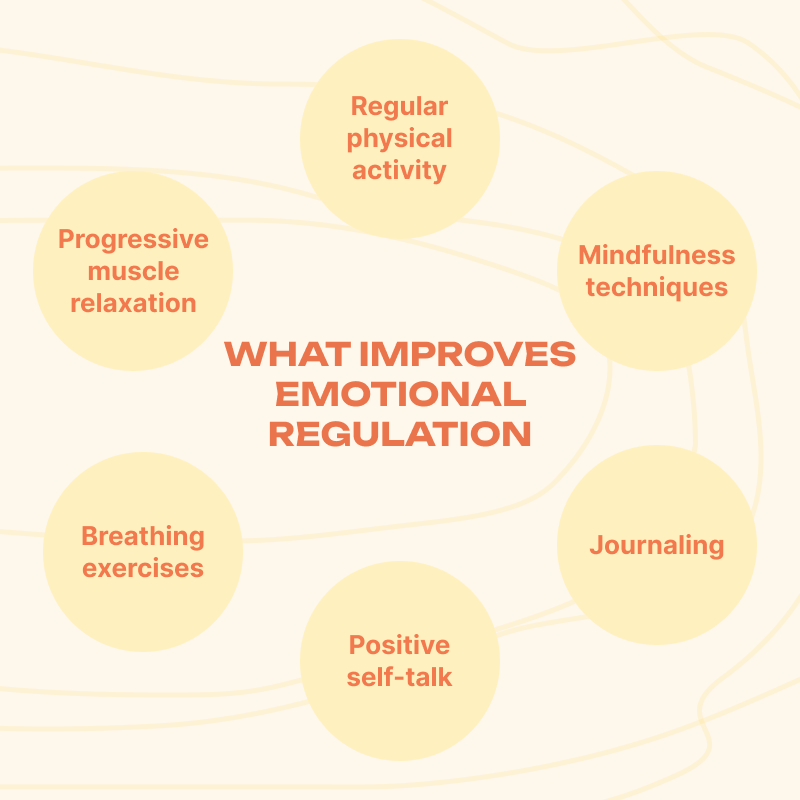We often hear the term ‘emotions’ but rarely make an effort to understand its importance. Emotions are an integral part of our life, and the ability to recognize and validate them is essential to stay mentally healthy and stable.
In Part 1 of the series, we discussed the various kinds of emotions, how our physical responses may be linked to them, and what underlying emotions may be present.
However, having the ability to manage our emotions can make all the difference in how we handle stressful situations. In this article, we will discuss emotional regulation: what it is, why it is important, and what activities and tools you can use to become more attuned to your emotions and better manage them in the moment.
Start managing your emotions with your personal treatment plan developed by doctors at MEDvidi. Stop letting your emotions overwhelm you.
Awareness of Emotions
Recognizing and validating our emotions has multiple benefits:
- Increased self-awareness. When we take the time to recognize and validate our own emotions, it helps us become more aware of how they affect our behavior. It also helps us to better understand why we feel the way we do about certain situations and how to better manage our emotions.
- Enhanced communication. Recognizing and validating emotions can improve communication between people, making it easier to understand what another person is feeling and constructively express our feelings.
- Improved relationships. Recognizing each other’s emotions can help build trust and strengthen relationships. It also encourages people to be open and honest about their emotions and allows them to better understand how their emotions impact the relationship.
- Reduced stress. Validating emotions can help to reduce stress levels. By being aware of our emotions and expressing them in a healthy way, we can better manage and cope with stressful situations.
- Better mental health. Recognizing and validating emotions can help people to better manage their mental health by creating a greater sense of emotional well-being.
Learning how to deal with emotions can give you the tools to cope with the challenges life throws at you. It is high time to start seeking professional help.
Emotional Regulation Activities
Emotional regulation activities are an essential part of self-care and mental health. They can help you to better manage your emotions and reactions, develop healthy coping mechanisms, and become more resilient in the face of stress and difficulty. In today’s world, it’s more important than ever to have strong emotional regulation skills.
These practices can help you to control emotions:
- Exercises. Physical activity can help to reduce stress and improve mood.
- Time in nature. Spending time outdoors in nature can be calming and help to clear the mind. Even something as simple as taking a walk or going for a bike ride can be beneficial.
- Deep breathing. Deep, slow breaths are an effective way to regulate emotions. This can be done through breathing exercises such as counting breaths, mindful breathing, or even just focusing on the breath. This simple exercise can help to slow down the heart rate and reduce feelings of stress or anxiety.
- Progressive muscle relaxation. Tense and relax each muscle group, starting with your toes and working your way up the body.
- Mindfulness. Focus and become aware of your thoughts and emotions in the current moment.
- Meditation. Mindful meditation can help to bring awareness to the present moment and calm the mind.
- Talking it out. Speak to a friend or family member and explain what you’re feeling. Talking can help you to understand why you’re feeling the way you do.
- Journaling. Write down your thoughts and feelings. It can help to clarify and express emotions in a productive way.
- Positive self-talk. Positive affirmations or self-talk can help to change the way you think and feel about a situation. This can be done by repeating positive statements to yourself or by writing them down.
- Music or art therapy. Listening to calming music or engaging in creative activities such as painting or drawing can be a great way to help regulate emotions and express them without words.
- Aromatherapy. Using essential oils such as lavender, chamomile, or sandalwood can help to relax and soothe the mind.
Remember that emotional regulation activities are not a quick fix. It takes time and practice to develop these skills, but the rewards are worth it. With regular practice, you can learn how to control your emotions and become more resilient in the face of difficulty.
If you do not want to let your strong emotions control you, qualified doctors at MEDvidi are here to help you with emotional regulation.

When to Seek Professional Help?
For some people, it can be a difficult process to learn and master healthy coping mechanisms to manage their emotional response. When left unchecked, emotions can become overwhelming and lead to unhealthy behaviors.
There are a few signs that can indicate it is time to seek professional help with emotional regulation:
- You have difficulty controlling your reactions to stress and other difficult situations, which makes you feel anxious, guilty, shameful, or inadequate.
- You experience extreme mood swings, such as feeling very low one minute and then suddenly very high the next.
- You develop a pattern of self-destructive behavior such as using drugs, alcohol, or engaging in risky activities.
- You feel like you can’t keep up with your responsibilities and your daily tasks.
- You feel like you are in danger of harming yourself or someone else.
Bottom Line
Regulating emotions lets you take control of your reactions. These skills also help you gain confidence in your ability to cope with any difficulty using simple yet effective practices described in this article.
Mental health MDs at MEDvidi can provide you with their professional advice on which strategy you can choose to feel empowered to control your emotions. They will develop an individual treatment plan, which may include psychotherapy and medication prescription if needed.











